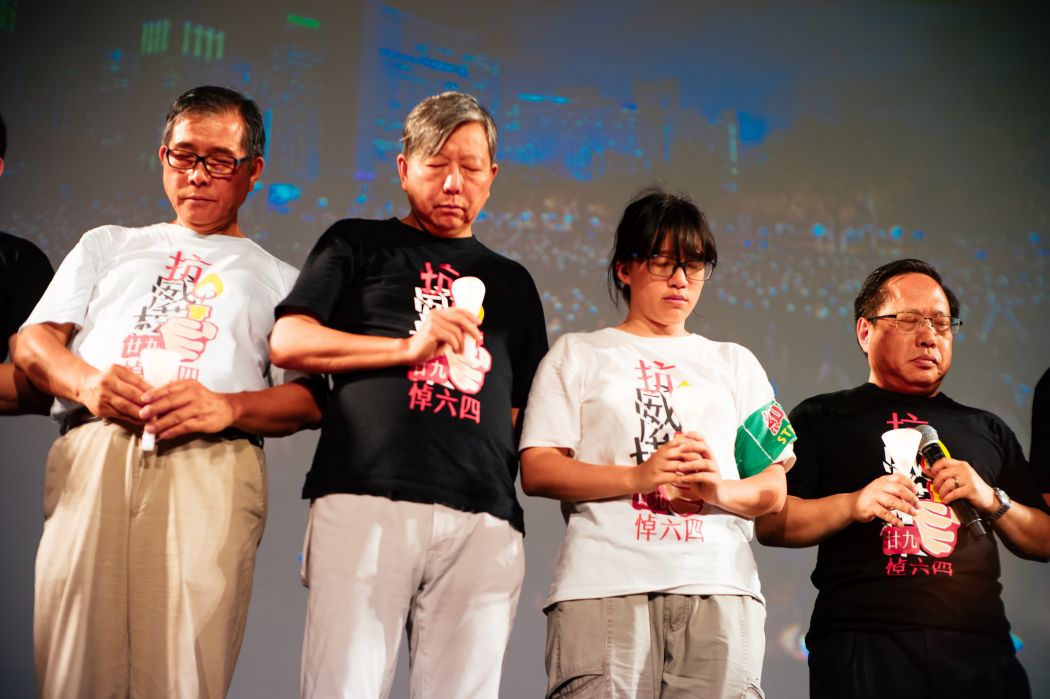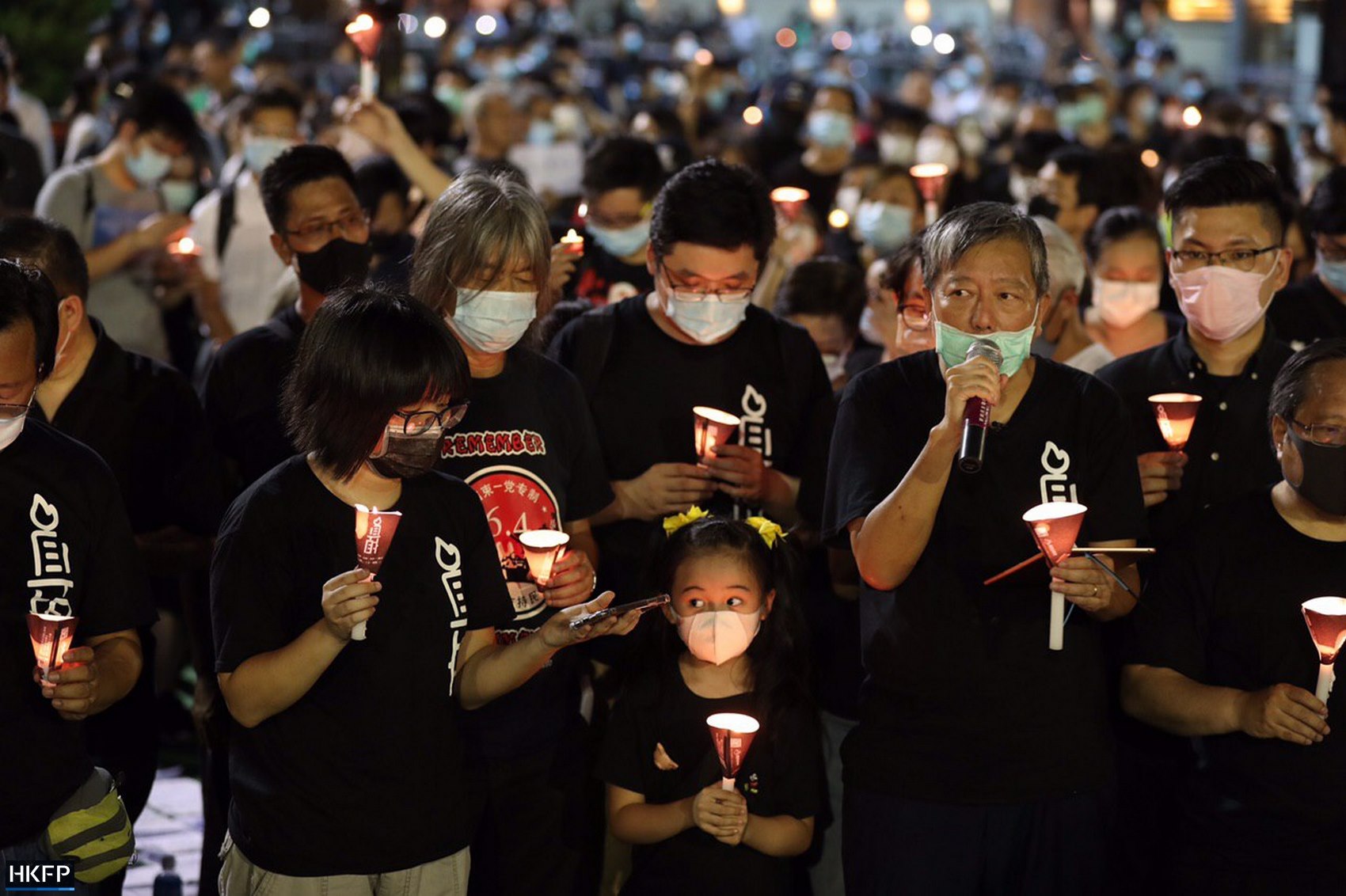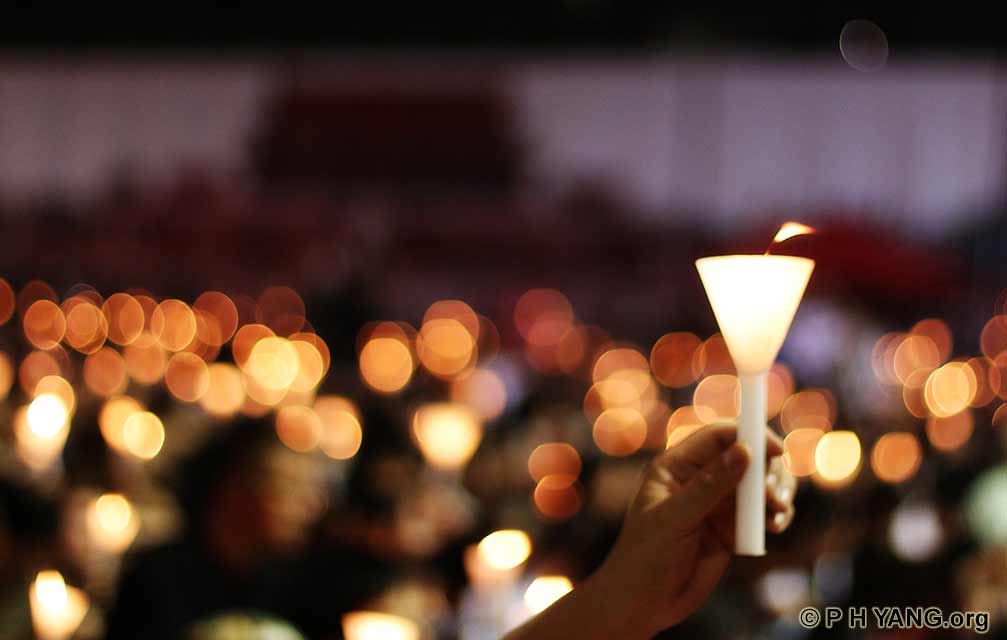Part of HKFP’s Shifting Narratives series.
The group which for decades helped Hongkongers remember the 1989 Tiananmen Massacre is on the verge of disbanding as its leaders face trial on national security charges. But as recently as two years ago, the city’s leader was citing the candlelight vigil – which it organised – as a symbol of Hong Kong’s enduring freedoms.

In the early years of the Special Administrative Region government after the 1997 handover, events and discussions to commemorate the massacre in Beijing were considered by government officials and pro-Beijing political figures as a symbol of the city’s freedom of speech and of assembly after its return to China.
On June 4, 2019 – the last authorised candlelight vigil before it was banned for two successive years on coronavirus grounds – Chief Executive Carrie Lam said in response to a reporter’s question: “Today is a day of lots of memories for many. To the SAR government, this enshrines that Hong Kong is a very free society. We uphold and safeguard the rights and freedoms of individuals in Hong Kong.”
After the vigil in Victoria Park the previous year, she commented: “Yesterday with cooperation by the police, there was an assembly, a demonstration, I think these reflect that Hong Kong is characterised by its respect and advocacy for freedom.”

But last week, the Hong Kong Alliance in Support of Patriotic Democratic Movements of China – the organisation which for thirty years called for an end to China’s one-party rule and justice for massacre victims – saw its leaders behind bars, its funds frozen, and its social media content removed following demands from the national security police.
Like the Alliance and their pan-democrat peers who submitted motions to commemorate June 4 victims in the legislature at the end of each May, many political figures and senior government officials once voiced public support for the Beijing student movement that ended in bloodshed, and expressed sympathy for its victims.
Hundreds, perhaps thousands, of people died when the People’s Liberation Army was deployed to crack down on protesters in Beijing, and the massacre sent shockwaves around the world. Masses of Hong Kong political figures signed petitions or published statements of condemnation.
Over the years, however, many have risen in politics as pro-Beijing figures or taken government positions, growing more tight-lipped about China’s political scar. The Communist Party has still yet to account for the incident and it suppresses all mention of it in the mainland.
From condemnation to ‘no comment’
In 1989, Leung Chun-ying, who went on to become Hong Kong chief executive and is now vice chairman of the Chinese People’s Political Consultative Conference, joined a group of fellow surveyors in publishing a newspaper statement shortly before the massacre. “Seeing a government attempting to use force to crack down on its patriotic people, we feel heartbroken,” it said.

The day after the massacre, he condemned the “bloody massacre” by the Chinese Communist Party and said Beijing had lost the confidence of Hongkongers.
As chief executive-elect in June 2012, Leung observed a minute of silence alongside democrats for the death of Li Wangyang, a dissident of the Tiananmen movement who died in mysterious circumstances after giving an interview with Hong Kong media. Leung later said he would observe a period of silence for anyone’s death.
But in 2014, after Leung had become chief executive, he told reporters that “the SAR government will not comment on the June 4th incident, as I’ve said in the two previous years.”
His two predecessors as chief executive, Tung Chee-hwa and Donald Tsang, expressed understanding and sympathy towards Hongkongers’ demands for justice for June 4 victims, while insisting that China had changed and that people should look forwards and not back.

Addressing the press in 1999, Tung said he told members of the Democratic Party “it is time to put down the baggage of June 4th and move forward; construct and build a better Hong Kong together and contribute to China’s further development.”
And on the 17th anniversary of the 1989 massacre, in 2006, then then-leader Donald Tsang said Hongkongers were coming to an “objective judgement” about the event as China’s economy soared.
“Hongkongers know the June 4th incident very well. Of course, the incident occurred 17 years ago, and in these 17 years the mainland has seen spectacular developments,” Tsang said.

‘Society’s conscience’
Financial Secretary Paul Chan went as far as to say in the legislature, when he was an accounting sector lawmaker in 2009, that he was deeply pained at the Beijing government’s targeting of students and other citizens with firearms and tanks.
“The night before June 4, I was watching on live television the latest developments of the Beijing student movement with my pregnant wife, and my blood was boiling. I told my wife: ‘I want to fly to Beijing to support the students,'” Chan said. “University students are society’s conscience.”

However, he also said that students had become pawns in political infighting, and without having insider knowledge it would be difficult to determine right from wrong. “Before getting a hold of all facts, it is hard for me to judge, and it is hard to speak of obtaining justice… I hope in the near future, the mainland could offer a renewed, thorough and fair characterisation for the June 4 incident,” he said.
When asked about the event in 2014 after he had become Secretary for Development, Chan told reporters he had nothing to add to his comments from 2009.

Last week, three of the Alliance leaders were charged with inciting subversion, an offence under the Beijing-imposed national security law, and five were arrested for failing to comply with a request for information under the law.
A total of 16 democrats and activists have so far been sentenced to jail or given suspended sentences for taking part in the unauthorised candlelight vigil in 2020, the first time it was banned under Covid-19 social gathering restrictions.
Support HKFP | Policies & Ethics | Error/typo? | Contact Us | Newsletter | Transparency & Annual Report | Apps
Help safeguard press freedom & keep HKFP free for all readers by supporting our team

LATEST FROM HKFP
HKFP has an impartial stance, transparent funding, and balanced coverage guided by an Ethics Code and Corrections Policy.
Support press freedom & help us surpass 1,000 monthly Patrons: 100% independent, governed by an ethics code & not-for-profit.










